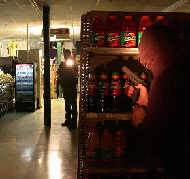Seminar Overview

The Deadly Misconceptions® seminar methodically examines the phenomena of
"questionable" police shootings. Questionable shootings, by our definition, are
those which entail officers shooting unarmed and non-assaultive suspects.
Contrary to common belief, as many as 43% of all police shootings may in fact
fall within the parameters of this definition. Errors in critical
decision-making are often attributable to judgment based upon situational and
behavioral cues, as well as perception impaired by low light conditions.
This endeavor picks up where others have left off. In this
one-day presentation, a nationally recognized authority on lethal force issues
will address complex, troubling issues in a comprehensive manner. In
addition,
you get
to interact with the presenter in way that other seminars generally don’t allow.
Issues Addressed:
-
How and why officers are finding themselves accused of a “bad shooting”?
Training and policy implications are then addressed.
-
The troubling aspects of decision-making in reduced light, conditions
under which most police shootings occur. This presentation explains why
officers are often severely disadvantaged, and how they might better cope
with darkness.
-
The overlooked difference between a “Must-Shoot” scenario and a
“May-Shoot” scenario.
-
The legal and tactical differences between an immediate threat and an
imminent threat.
Surviving the aftermath of an officer-involved shooting: you’ve survived the
confrontation, now you’ll get an expert’s insight as to how to survive the
investigation and media scrutiny that follows
Many
officer-involved shootings have been politicized, often to the detriment of the
officers expecting fairness and due process when their shooting is being
reviewed. Why does this occur? How much critical, exculpatory information has
been over-looked in officer-involved shootings?
Topical Overview:
-
Is it true that as many as 25-43% of all police shootings
involve suspects who are “unarmed and not-assaultive”?
-
When do situational and behavioral cues contribute to an
objectively reasonable “furtive movement” shooting?
-
Are police shootings typically influenced by racism, or is
there a more
rational and innocuous explanation?
-
Is it true that police miss with roughly 80% of the shots
they fire, or have such measures of street hit-proficiency been terribly
skewed?
-
Has the widespread use of “night-sights” failed to yield any benefit in low
light shootings?
-
What overlooked shooting incident variable seems to
diminish officer hit ratios by as much as 82%?
-
What overlooked incident variable seems to increase the
number of shots fired by officers by as much as 45%?
-
How does the "Two-Second Rule" apply to the police use of
deadly force when faced with a vehicular assault?
-
Has contemporary police training better prepared officers
for deadly force scenarios, or has it contributed to the most egregious
problems?
-
Do officers who have been involved in a deadly force
scenario get a fair and thorough investigation, or are serious
considerations being overlooked?
Who Should Attend This
Seminar:
-
This seminar is a must for all sworn officers, and should
certainly be considered a must for police trainers.
-
Investigators who are tasked with the investigation of
officer-involved shootings will find this seminar extremely enlightening, if
not essential.
-
Policy makers and police administrators will also benefit
greatly from this series of presentations. Numerous policy and procedural
issues are explored.
-
Prosecuting attorneys, and those tasked with defending
officers accused of using inappropriate or excessive levels of force.
-
City, county and state administrators tasked with managing
vicarious liability and/or public relations.
While the prevailing
content of this seminar is certain to generate controversy, it is essential that
police trainers and administrators confront these issues head-on, armed with the
facts to overcome them with.
Course Instructor:
Thomas J. Aveni, MSFP
Mr. Aveni began service as a police officer in
1978, and has been a police training specialist since 1983. Most recently, he
served as a police training coordinator with Smith & Wesson Academy from
1990-2001. He currently serves as a staff researcher and forensic consultant
with the Police Policy Studies Council.
Tom Aveni has AAS/BS degrees in Criminal Justice,
and an MS in Forensic Psychology. He has authored numerous articles that have
been published in police periodicals, and is co-authoring the book, “Surviving
the Nightshift.”
Please Note:
All applications,
tuition or POs must be received prior to the beginning of class.
Tuition includes a comprehensive classroom manual and all classroom and range
materials.
Eligible candidates for this
program are members of the police, corrections, military and security
communities. ALL applicants MUST provide credentials of their affiliation with
an accredited law enforcement, corrections, military or security organization
for acceptance into this program.
|
Length: |
1 days/ 8 hours |
|
Tuition: |
$175 |
|
Dates: |
(See
Course Hosting) |
|
Location: |
Please call 877-267-7772 ext. 3 |
|
|

